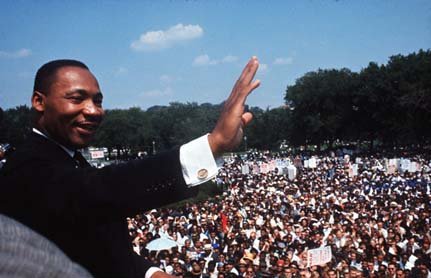
 Fifty years ago today, Dr. Martin Luther King, Jr., the noted civil rights champion of the United States, stood on the steps of the Lincoln Memorial in Washington, D.C. and addressed a crowd of 250,000 civil rights supporters. At the end of his address, he departed from the prepared text and discussed his dream of a future America where children would be judged by their character and not their race. This speech became the seminal moment in the civil rights era, and one of the most important in American history.
Fifty years ago today, Dr. Martin Luther King, Jr., the noted civil rights champion of the United States, stood on the steps of the Lincoln Memorial in Washington, D.C. and addressed a crowd of 250,000 civil rights supporters. At the end of his address, he departed from the prepared text and discussed his dream of a future America where children would be judged by their character and not their race. This speech became the seminal moment in the civil rights era, and one of the most important in American history.
Dr. King’s dream was not simply about civil rights, though. While he advocated for racial equality and equal justice under the law, he also envisioned a future world where race was not a barrier between people. The audience he intended to address included Americans of all races, creeds, and faiths. Dr. King was more than just a black hero; he was a hero to all rational men and women.
I understood that truth about Dr. King’s audience very early in life and when given the opportunity to recognize his accomplishments, I jumped at the chance. In the sixth grade, my teachers gave our class a project: we were to pick a personal hero in history and perform a monologue as that individual in a sort of live “Hall of Heroes.” Most of my fellow students picked the most obvious historical choices, such as Abraham Lincoln, Florence Nightingale, and Franklin Roosevelt. I chose Dr. Martin Luther King, Jr.
While that might seem like another obvious choice, my teachers had a real problem with it because I was white. They told me that Dr. King was a black hero, and that perhaps I should choose a more suitable hero for myself.
Isn’t he a hero for everyone? I asked them. No, they told me, he is only a hero for black people.
I went home that evening, confused by the conversation with my teachers and questioning my choice. Had I made a mistake in choosing Dr. King? Was he solely a black hero? I went back to my school books, trying to arrive at an answer, and once again I found the story of Dr. King’s “I Have a Dream” speech. And after re-reading Dr. King’s words, I knew, without a doubt, that I had chosen the right person to celebrate.
When I returned to class the next day, my teachers asked me who would be my choice for the assignment. I told them, as I had done the day before, that my choice was Dr. Martin Luther King, Jr. Once again, they asked me to change my decision. I refused their request, telling them that Dr. King’s ideas and accomplishments were the type that all people could admire. After several more fruitless attempts to dissuade me, they finally accepted that I was resolute in my decision.
A few days later, having consigned themselves to the fact that I would be portraying Dr. Martin Luther King, Jr., they approached me with another request: since I was going to portray Dr. King, they said, I should wear black makeup to change my complexion. In their defense, I do not think that they really realized what they had asked of me, although I may be wrong. But even though I was only 12 years old, I knew that wearing blackface was not only an insult to black Americans, but also an insult to what Dr. King represented. And so I again refused.
Eventually the day came for our performance, which we were to give in front of students from other classrooms. We were lined up shoulder to shoulder, and as the teachers and students from the other classes approached, we, in turn, performed an original monologue in the voice of our hero. I was positioned as the last “hero” in line, likely placed there as the result of my teachers’ embarrassment rather than as the culminating performance. I performed my monologue as Dr. King, my only costume a business suit (as was appropriate for the civil rights leader), not quite as fanciful as the Abraham Lincoln or General Patton before me. In my performance, I drew upon all that I had learned about Dr. King, summarizing his viewpoints on social injustice, on the plight of black Americans, and on the dream of racial harmony.
I was quite proud of my effort, although my unwillingness to change my choice did affect my grade. I ultimately received a “B” for the assignment, losing points for “effort,” “understanding the assignment,” and an “uninspired” costume. I didn’t challenge the injustice of the grade, which was ironic, I suppose; regardless, I felt good about the experience and certain that I learned more from the assignment than any of my fellow classmates who may have made a better grade. For one, I learned that racism could be subtle and influence us in ways of which we may be unaware.
As a 42 year-old white man, I have to say that Dr. King continues to have a big impact on the way I perceive the world. Dr. King was not simply a champion of civil rights for blacks; he was a champion for all people. His desire was not just for equality, but unity for all mankind. One family. One race. Today, we are still trying to come to terms with Dr. King’s message, to make his dream a reality. But, as the Chinese sage Lao Tzu said, “The journey of a thousand miles begins with a single step.” And on August 28, 1963, Dr. King took a tremendous step on the road to realizing his dream. Words have power, and Dr. King’s words continue to echo through the halls of time influencing generations of Americans, much like myself.
